12 Best Suburbs in Brisbane for Your Family’s Forever Home
You and your family are about to make one of the biggest decisions you’ll ever make in your lives: buying a forever home.
Buying the perfect home to live in for the rest of your life is exciting, especially in Brisbane. But it can quickly become overwhelming.
There’s a huge number of factors to consider, such as the price, cost of living, surrounding amenities or proximity to schools.
But after reading this article, you’ll find there’s no need to worry.
Over the past 12 months, our team of real estate analysts have studied hundreds of suburbs across Brisbane and dived deep into the data.
We’ve looked at house prices, suburb demographics and proximity to major areas of Brisbane to put together a research-backed list of the 12 best suburbs in Brisbane for your family’s forever home.
If you’re on the journey to find your dream home and are seriously considering a property in Brisbane, then you’ll want to keep reading.
IMPORTANT
Before reading, grab our checklist on the 25 questions to ask when negotiating to purchase a Brisbane property.
Have this handy when reading through our list.
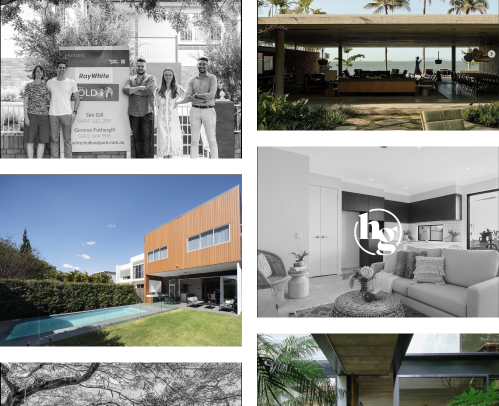
Here they are: Brisbane’s 12 best suburbs for a forever home (ranked)
We’ve put together a list of what our analysts consider the 12 top suburbs if you’re looking for a forever home in Brisbane.
1. Bulimba 4171
Main residents: Couples with children
Main occupations: Professional
Median age: 30–39 years
Average property price (house): $1,830,000
Average property price (apartment): $776,250
Statistics from CoreLogic
Bulimba is one of the most beautiful suburbs in Brisbane, offering a vibrant and relaxed lifestyle perfect for young families in their late 20s and early 30s. It truly is the epitome of ‘good suburb living’.
Suburb profile
Close to: CBD, schools, Brisbane River, recreational facilities, public transport Located just a few kilometres east of the Brisbane Central Business District (CBD), Bulimba is a convenient choice for those who work in the city. The suburb’s Oxford Street precinct is a popular destination, featuring an array of cafes, restaurants, boutiques and cinemas. The suburb also has parks, fitness centres and recreational facilities.
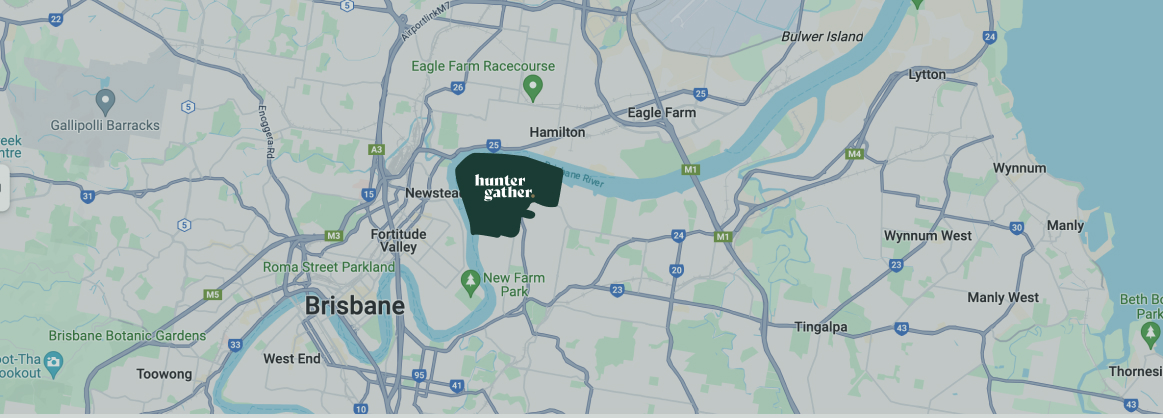
Situated along the Brisbane River, Bulimba offers many waterfront properties and picturesque river views. Riverside living provides a sense of tranquillity and natural beauty many find appealing.
Property value
Bulimba’s median property value has increased steadily over the past 10 years, spiking most recently after the COVID-19 pandemic. The following graph shows how the median property of Bulimba has increased over the past decade.
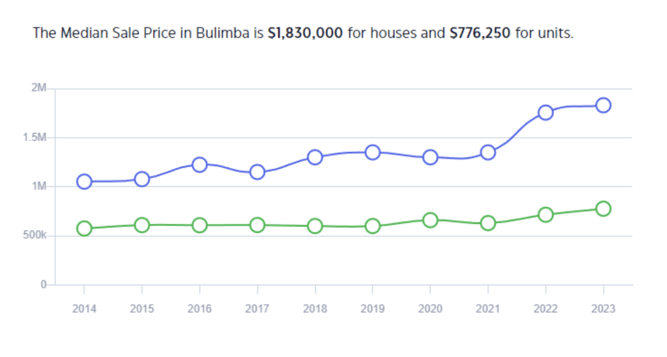
Demographics
Bulimba’s population was 6,842 in 2016, which was a 15.20% increase since 2011. According to ABS Census Data (2021), 48.34% of adults in Bulimba are married, with an average household size of 2.4 people and a median household monthly income of $14,505.
Age
Most of Bulimba’s population are aged 30–39 (18%). Here’s a snapshot of the age groups who live in the suburb.

Occupation
Bulimba’s residents mainly comprise professionals (34.4%), managers (21.6%) and clerical workers (13.6%).
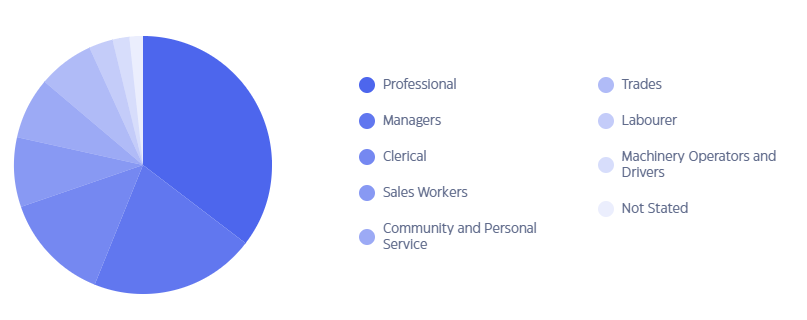
Income
Most residents in Bulimba reported an income of over $182,000 per year.
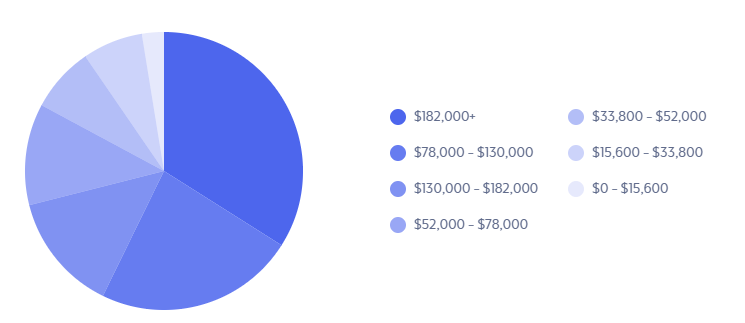
Links to key market data:
2. Hawthorne 4171
Main residents: Couples with children
Main occupations: Professional
Median age: 40–49 years
Average property price (house): $1,826,000
Average property price (apartment): $700,000
Statistics from CoreLogic
It has everything a family needs when looking for a dream home and perfect suburb.
Suburb profile
Close to: CBD, schools, Brisbane River, coffee shops, restaurants, public transport
Hawthorne is located just a few kilometres east of the Brisbane CBD, offering a relatively short commute for those working in the city.
It’s also nicely situated along the Brisbane River, which means you can find waterfront properties and enjoy beautiful river views.

Also located close to the Oxford Street precinct, Hawthorne offers a variety of cafes, restaurants, boutiques and entertainment options.
Property value
Hawthorne’s median property value has increased since 2014 to reflect the growth of the suburb and its enticing riverside location, with a spike during the recent post-pandemic boom.
The following graph shows how the median property of Hawthorne has increased over the past decade.

Demographics
Hawthorne’s population was 4,986 in 2016 – a 4.4% increase since 2011.
According to ABS Census Data (2021), 46.90% of adults in Hawthorne are married, with an average household size of 2.6 people and a median household monthly income of $5,956.
Age
Most Hawthorne residents are 40–49 years of age. Here’s a snapshot of the age groups who live in the suburb.
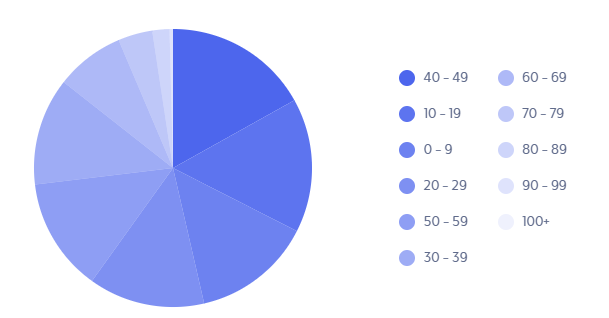
Occupation
The bulk of Hawthorne’s residents are professionals (35.3%), managers (20.7%) and clerical workers (13.6%).
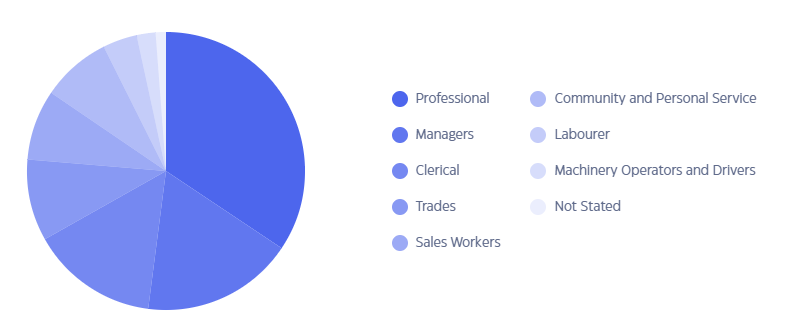
Income
Most of Hawthorne’s residents reported an income of over $182,000 per year.
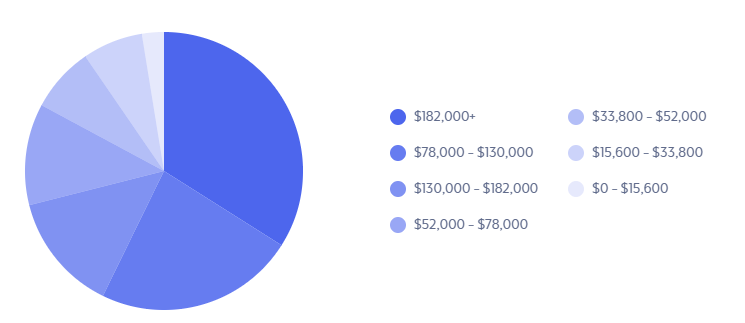
Links to key market data:
3. Camp Hill 4152
Main residents: Couples with children
Main occupations: Professional
Median age: 40–49 years
Average property price (house): $1,350,000
Average property price (apartment): $685,000
Statistics from CoreLogic
Camp Hill is one of Brisbane’s most convenient suburbs. It’s leafy and peaceful – a wonderful place you and your family can call home.
A growing suburb, Camp Hill features plenty of shops and amenities. It’s great for young professionals, young families and retirees alike.
Suburb profile
Close to: CBD, Westfield, local schools, recreational facilities, public transport, trendy coffee shops, hospitals
Camp Hill offers a comfortable and convenient lifestyle with a range of amenities. Within or near this suburb, you can find Carindale Shopping Centre, restaurants, and entertainment.
Camp Hill is also relatively close to the CBD, making it a convenient location for those who work in the city. It’s a short distance from hospitals as well, such as Greenslopes Private, Princess Alexandra and Brisbane Day Hospital.
.jpg?width=918&height=330&name=Group%2048096103%20(2).jpg)
Known as a ‘leafy suburb’, Camp Hill features several parks and green spaces, providing opportunities for outdoor activities, picnics and relaxation.
Property value
Camp Hill’s property value has boomed over the past 10 years, and especially in the past 2–3 years in light of the post-pandemic spike.
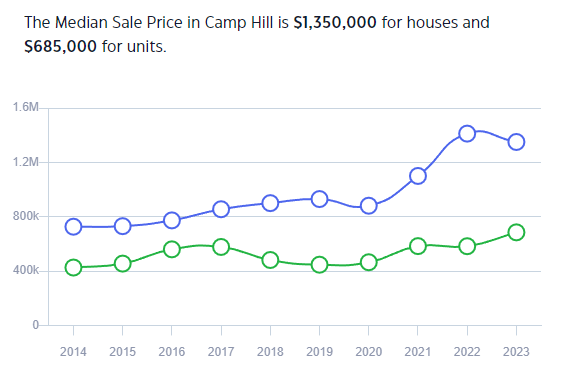
Demographics
Camp Hill’s population was 11,191 in 2016, which was a 6.20% increase since 2011. According to ABS Census Data (2021), 50.40% of adults in Camp Hill are married, with an average household size of 2.8 people and a median household monthly income of $14,272.
Age
Most of Camp Hill’s residents are aged 40–49 years (18.1%). Here’s a snapshot of the age groups who live in the suburb.

Occupation
Camp Hill’s residents are primarily professionals (34.4%), managers (17.7%) and clerical workers (14.8%).

Income
Most residents in Camp Hill reported an income of over $182,000 (26.5%) per year.

Links to key market data:
IMPORTANT
Before reading, grab our checklist on the 25 questions to ask when negotiating to purchase a Brisbane property.
Have this handy when reading through our list.

4. Coorparoo 4151
Main residents: Couples without children
Main occupations: Professional
Median age: 20–29 years
Average property price (house): $1,350,000
Average property price (apartment): $524,000
Statistics from CoreLogic
Coorparoo is an awesome suburb for people of all ages, although particularly attractive to those in their 20s.
A hop, skip and a jump to the CBD, Coorparoo is teeming with cafes and restaurants. It’s a dream suburb with great character.
Suburb profile
Close to: CBD, cafes, restaurants, recreational amenities, parks, hospitals, Brisbane River
Coorparoo is a convenient and high-quality neighbourhood in the heart of Brisbane. It’s only about 4 kilometres south of the CBD, so it’s accessible if you work in the city.
With a comfortable lifestyle, a low crime rate, a strong sense of community and plenty of public transport options, Coorparoo should definitely be on your list when looking for a forever home.
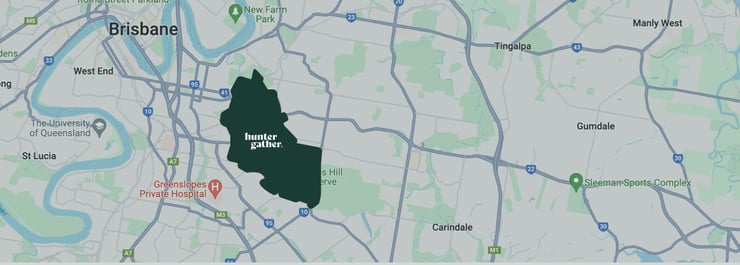
You’ll always be close to a great feed in Coorparoo, and you’ll also get some stunning views of the city if you buy an apartment.
Property value
Coorparoo’s property value has steadily increased over the past decade. It was also one of the suburbs that boomed during the post-lockdown rush in 2021.
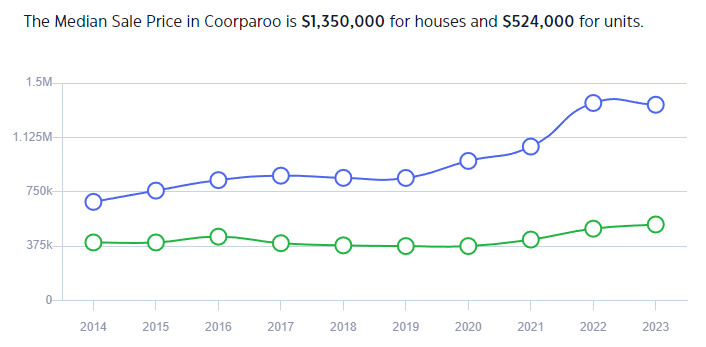
Demographics
Coorparoo’s population was 16,24 in 2016 – a 9% increase from 2011.
According to ABS Census Data (2021), 38.87% of adults in Coorparoo are married. The average household size is 2.3 people, and the median household monthly income is $11,384.
Age
Most of Coorparoo’s residents are young, within the 20–29 age range (19.9%). Following closely behind are those aged 30–39 years (19%).

Occupation
Most of Coorparoo’s residents are professionals (35.8%), clerical workers (14.6%) and managers (13.2%).

Income
Most residents in Coorparoo reported an income between $78,000 and $130,000 (24.1%) annually.
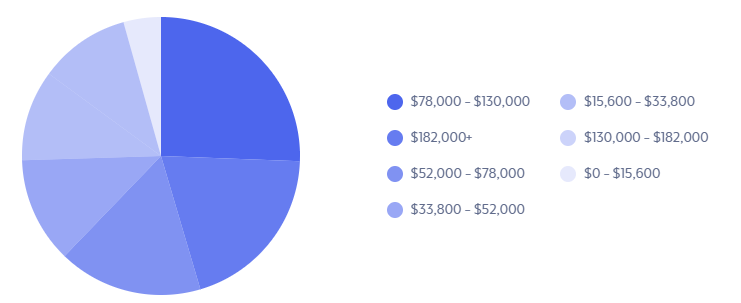
Links to key market data:
5. Tarragindi 4121
Main residents: Couples with children
Main occupations: Professional
Median age: 40–49 years
Average property price (house): $1,240,000
Average property price (apartment): Data not available
Statistics from CoreLogic
Tarragindi is often referred to as one of the best suburbs in south Brisbane. It’s close to the city, you’re spoiled for choice when it comes to food and coffee, and it’s well-connected to public transport and boasts a super-friendly neighbourhood.
What more could you want?
Suburb profile
Close to: CBD, schools, cafes, restaurants, suburbia, parks, running tracks, public transport, bikeways
Tarragindi is known for its green, suburban paradise feel, family-friendly environment and community vibe.
The suburb also has some excellent schools nearby, such as Weller’s Hill State School, St Elizabeth Primary, Holland Park State High and Yeronga State High School. It’s full of young families and just a 10–15 bus ride into the city.
.jpg?width=869&height=312&name=Group%2048096103%20(3).jpg)
Featuring several parks and green spaces, Tarragindi provides numerous opportunities for outdoor activities, picnics and relaxation.
Property value
Tarragindi’s property value has enjoyed a steady increase over the past 10 years. Like most suburbs, it experienced a spike in 2021.
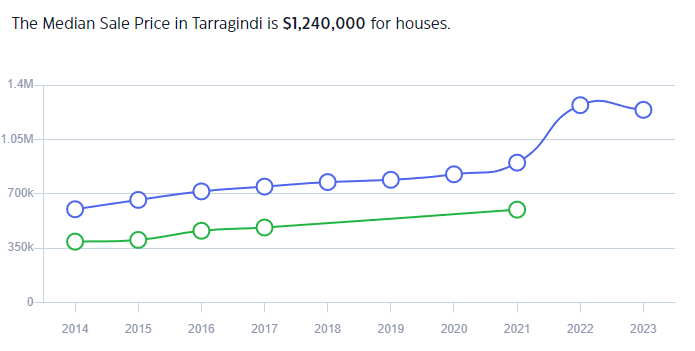
Demographics
Tarragindi’s population was 10,794 in 2016, which was an 8.3% increase from 2011.
According to ABS Census Data (2021), 53.08% of adults in Tarragindi are married, with the average household comprising 2.9 people and a median household monthly income of $13,300.
Age
Most of Tarragindi’s residents are aged 40–49 (16.2%). Following closely behind are kids – 0–9 years old (15.6%) – and people between 30 and 39 years of age (14.5%).
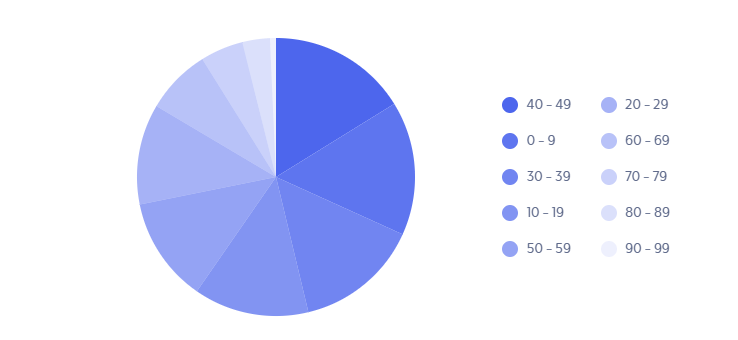
Occupation
Tarragindi’s residents are mostly professionals (37%) and managers (14.2%).

Income
The majority of Tarragindi’s residents reported an income of over $182,000 annually.
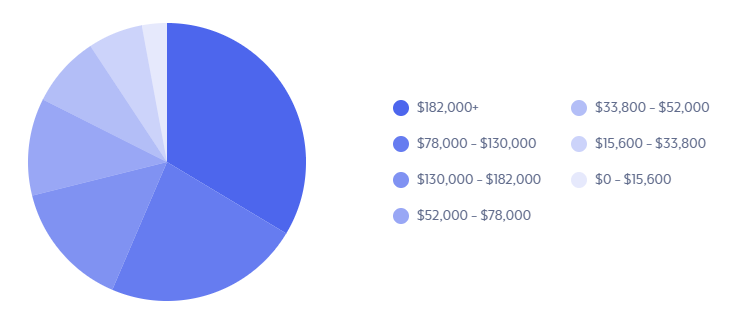
Links to key market data:
6. New Farm 4005
Main residents: Couples without children
Main occupations: Professional
Median age: 20–29 years
Average property price (house): $2,650,000
Average property price (apartment): $760,000
Statistics from CoreLogic
New Farm has been heralded as the place to enjoy the good life. It’s a highly desired suburb – probably one of the most sought-after in the city’s inner north region.
Suburb profile
Close to: CBD, Brisbane River, cafes, restaurants, parks, public transport, hospitals, schools, Brisbane Airport
New Farm is in the heart of Brisbane’s CBD, so it’s perfect if you enjoy a metropolitan lifestyle and work in the city.
Situated along the Brisbane River, New Farm has many properties with gorgeous river views. Riverside living can offer a serene environment, perfectly mixed with the excitement of the urban jungle.
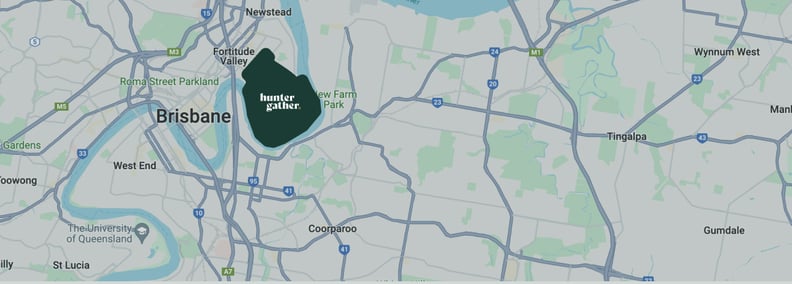
Virtually anything you need is within reach if you live in New Farm. It’s close to everything, from schools and restaurants to hospitals and recreational facilities.
The price tag is a little higher than some of the other areas on this list, but every cent is worth it.
Property value
When the pandemic hit, New Farm’s property value doubled over the course of three years.
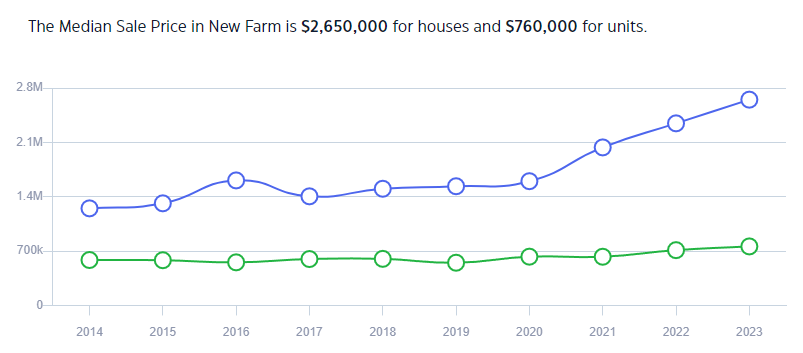
Demographics
In 2016, New Farm’s population was 12,536, which was a 10.6% increase from 2011.
According to ABS Census Data (2021), 31.14% of adults in New Farm are married. The average household has 1.9 people, and the median household monthly income is $12,692.
Age
Most New Farm residents are within the age range of 20–29 years (22.1%). Following closely are those aged 30–39 (21%).
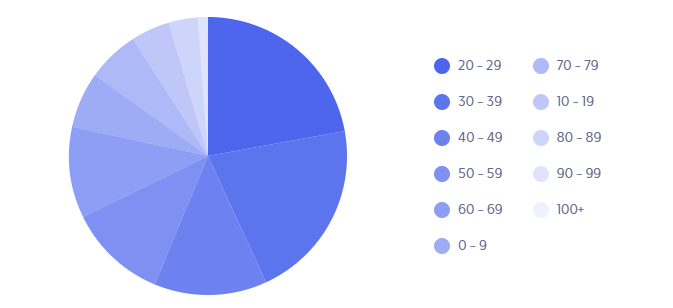
Occupation
For the most part, New Farm’s residents are professionals (40.3%) and managers (16.3%).
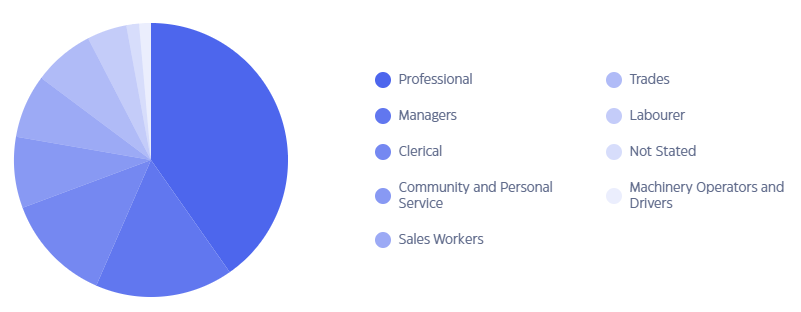
Income
Most residents in New Farm reported an income between $78,000 and $130,000 (22.5%), followed closely by $182,000+ (19.4%) per year.
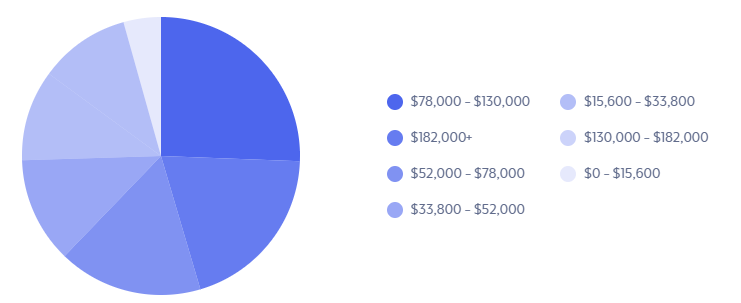
Links to key market data:
7. Teneriffe 4005
Main residents: Couples without children
Main occupations: Professional
Median age: 30–39 years
Average property price (house): $3,002,000
Average property price (apartment): $746,750
Statistics from CoreLogic
It’s close to the airport and the city, and the community is trendy, sophisticated and modern.
Suburb profile
Close to: CBD, Brisbane River, cafes, restaurants, parks, public transport, hospitals, schools, Brisbane Airport
One of the oldest suburbs in Brisbane, Teneriffe blends a rich history with modern architecture. The result is a unique, charming riverside community that’s highly attractive to young couples and those seeking a vibrant place to live.
Located within minutes of the CBD, Teneriffe offers a cosmopolitan lifestyle. It offers some incredible views of the water, too.
.jpg?width=753&height=271&name=Group%2048096103%20(4).jpg)
With a strong sense of community, a low crime rate and connections to public transport, it isn’t surprising that Teneriffe is one of the most sought-after suburbs in the city.
Property value
Teneriffe’s property value has enjoyed an ongoing rise from 2014 to 2023, spiking in 2017 and again in 2021–2022.
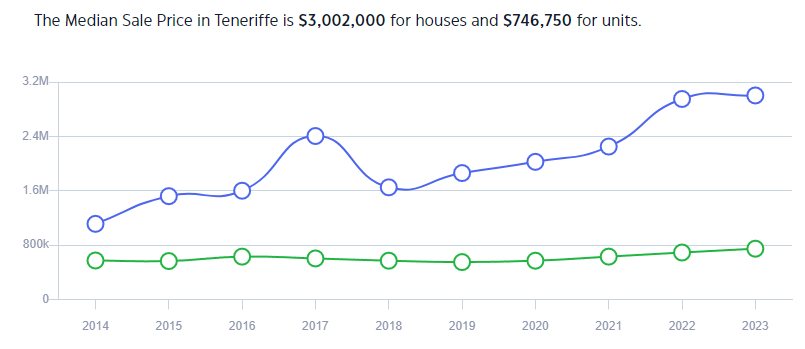
Demographics
Teneriffe’s population was 5,344 in 2016. That’s a 13.7% increase from 2011.
According to ABS Census Data (2021), 32.60% of adults in New Farm are married, with an average household size of 1.9 people and a median household monthly income of $14,016.
Age
Teneriffe’s residents are primarily aged 30–39 (29.1%). Following closely are those 20–29 years of age (23%).
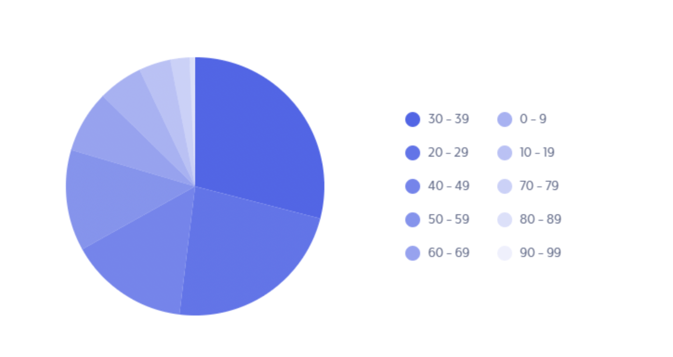
Occupation
The majority of Teneriffe’s residents are professionals (44.5%) and managers (20.4%).

Income
Most residents in Tenerife reported an annual income of over $182,000 (30.3%), followed by $78,000–$130,000 (26.9%).
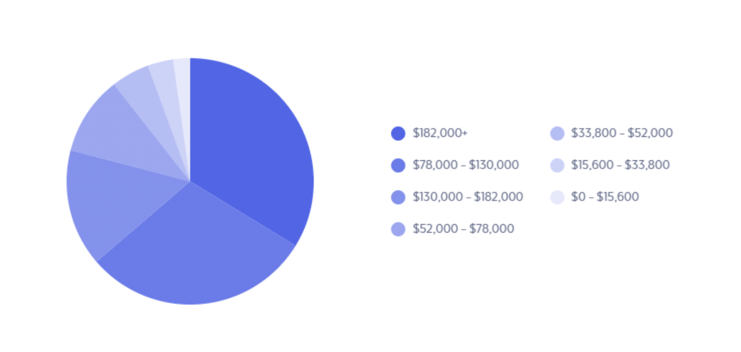
Links to key market data:
IMPORTANT
Before reading, grab our checklist on the 25 questions to ask when negotiating to purchase a Brisbane property.
Have this handy when reading through our list.

8. Clayfield 4011
Main residents: Couples without children
Main occupations: Professional
Median age: 30–39 years
Average property price (house): $1,608,000
Average property price (apartment): $475,450
Statistics from CoreLogic
Suburb profile
Close to: CBD, cafes, restaurants, parks, public transport, hospitals, schools, Brisbane Airport
Anyone looking for a lively environment that’s close to everything that the city offers would do well buying their forever home in Brisbane.
The fantastic thing about Clayfield is that it’s close – but not too close – to everything you need. Delightful restaurants and first-rate schools are nearby, and there are plenty of houses with amazing views.
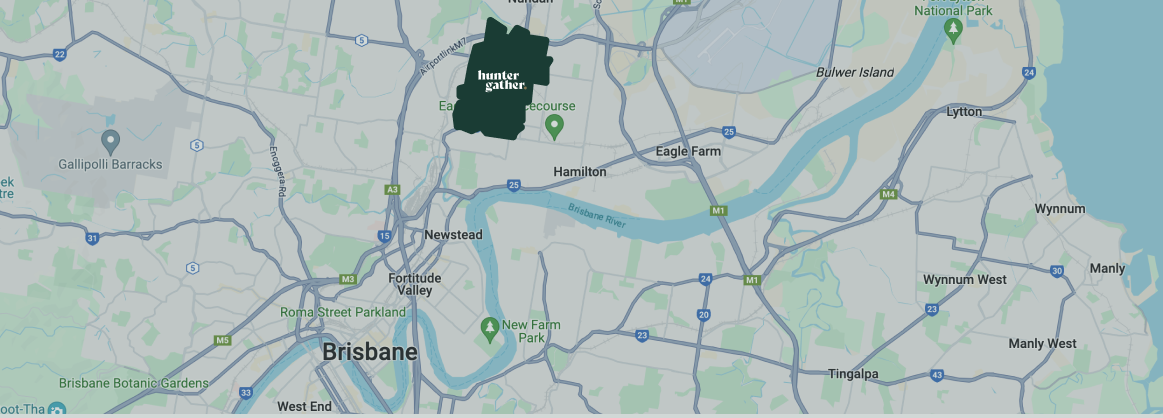
Clayfield is close to Toombul Shopping Centre, 15 minutes from the CBD and also 15 minutes from Shornecliffe Pier – perfect if you want to go fishing.
Property value
Clayfield’s property value has been on a steady rise since 2018, enjoying a swift uptrend since the post-pandemic boom.
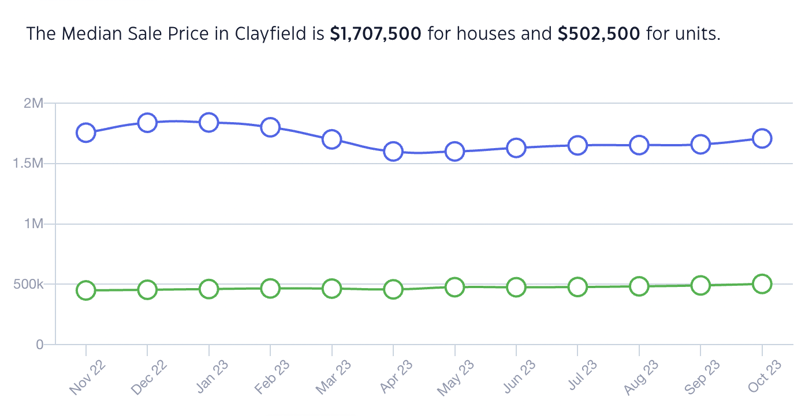
Demographics
In 2016, Clayfield’s population was 10,585 – a 5.8% increase from 2011.
According to ABS Census Data (2021), 39.8% of adults in Clayfield are married. The average household comprises 2.2 people, and the median household monthly income is $11,368.
Age
Mostly, Clayfield’s residents are aged 30–39 years (17.5%), 20–29 years (17.4%) and 40–49 years (14.2%).
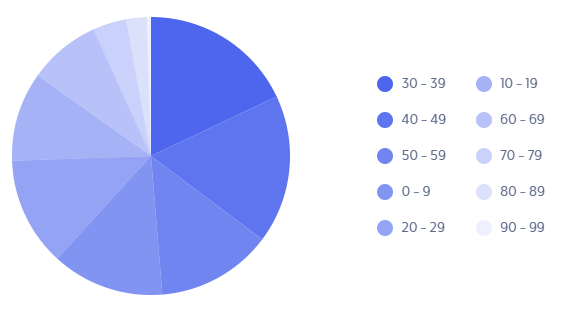
Occupation
Most of Clayfield’s residents are professionals (32.8%).
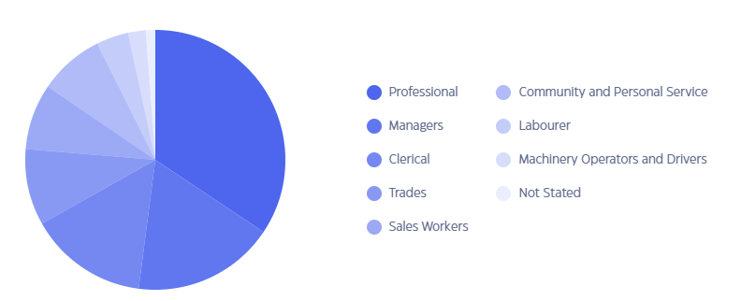
Income
The most commonly reported annual income of residents in Clayfield is between $78,000 and $130,000 (23.5%).

Links to key market data:
9. Ascot 4007
Main residents: Couples without children
Main occupations: Professional
Median age: 40–49 years
Average property price (house): $2,390,000
Average property price (apartment): $556,000
Statistics from CoreLogic
Ascot is one of the most prestigious suburbs in Brisbane. Close to the CBD, the airport, the river and more, it’s a vibrant community that every resident loves.
Suburb profile
Close to: CBD, cafes, Brisbane River, restaurants, parks, public transport, hospitals, schools, Brisbane Airport, Eagle Farm Racecourse
Ascot has an abundance of beautiful, well-maintained properties, tree-lined streets and a sense of affluence that appeals to those seeking an upscale lifestyle.
It’s a short commute to the CBD – perfect if you work in the city. Close to schools, parks and public transport, Ascot is the ideal place to raise a family and live a quiet life.
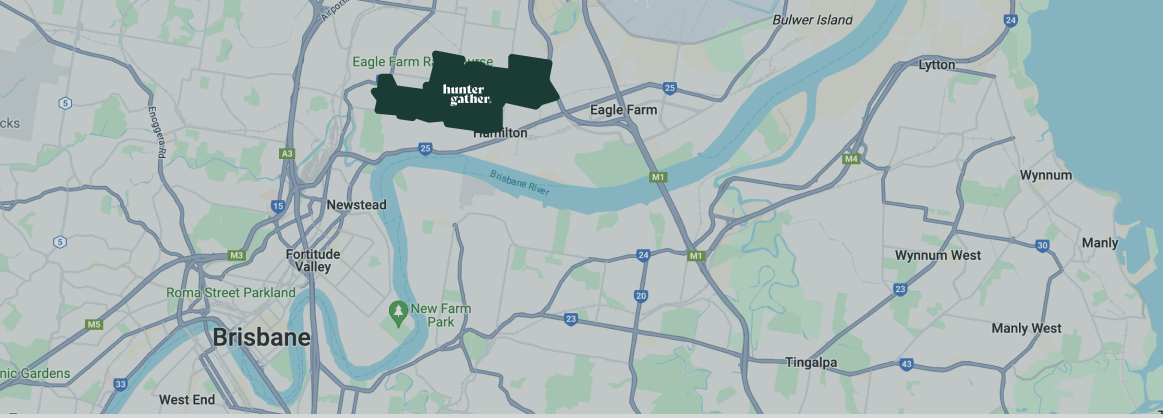
Even though Ascot is more of an upscale place to live, it still has a village-style community feel.
Property value
Ascot’s property value has been fluctuating since 2014, before enjoying a sharp upturn from 2020 onwards.

Demographics
Ascot’s population was 5,760 in 2016, increasing by 0.5% from 2011’s level.
According to ABS Census Data (2021), 41.68% of adults in Ascot are married, with the average household made up of 2.3 people and a median household monthly income of $13,204.
Age
Most of Ascot’s residents are aged 40–49 years (15.3%), 50–59 years (14.8%) and 30–39 years (13.8%).

Occupation
The majority of Ascot’s residents are professionals (33.7%), followed by managers (17.3%).

Income
Most residents in Ascot reported an income of over $182,000 per year.
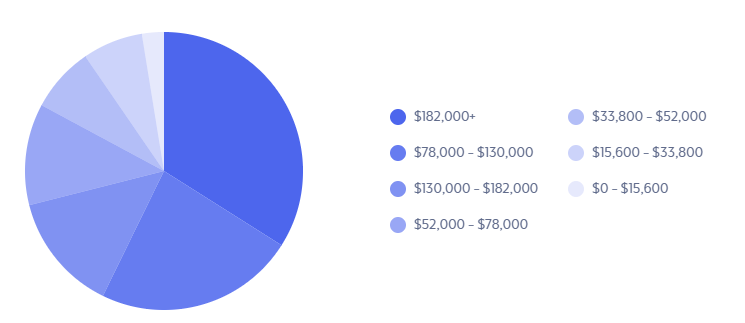
Links to key market data:
10. Ashgrove 4060
Main residents: Couples with children
Main occupations: Professional
Median age: 40–49 years
Average property price (house): $1,502,500
Average property price (apartment): $615,250
Statistics from CoreLogic
Ashgrove, located northwest of the city, offers a comfortable and family-friendly lifestyle with a range of amenities. Undoubtedly, it’s one of the best suburbs in Brisbane to start a family and buy a forever home.
Suburb profile
Close to: CBD, schools, cafes, restaurants, exercise trails, pubs, healthy living, parks, recreational facilities
Ashgrove is the perfect combination of leafy suburbia and metropolitan lifestyle. Its detached single-dwelling houses have become known as the unique ‘Ashgrovian’ Queenslander style.
It’s rich with heritage listings, boasting old buildings such as those housing Oakleigh State School and Ashgrove State School.
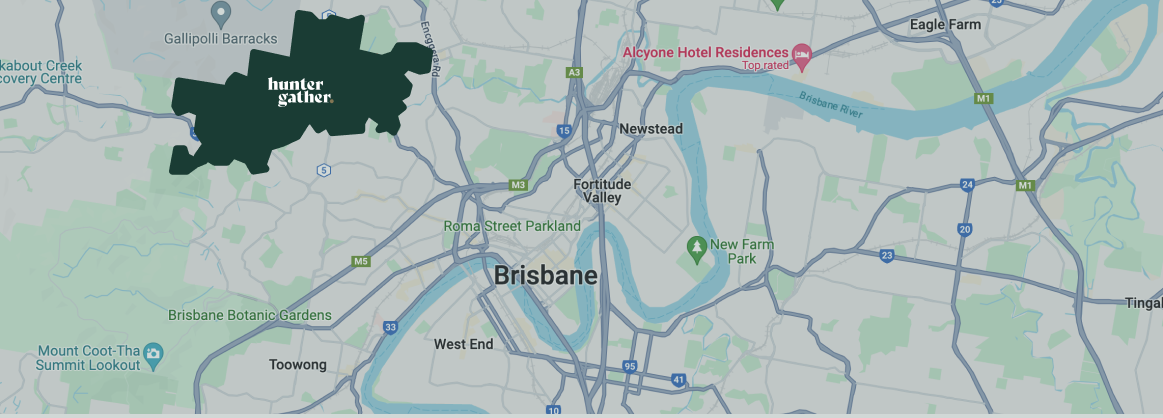
Not to mention, Ashgrove has gained a lavish reputation when it comes to coffee, restaurants and fine dining. You have easy access to the best places without going far from home.
Property value
Ashgrove’s property value has increased steadily for over a decade. From 2020 onwards, it has been on a constant rise.
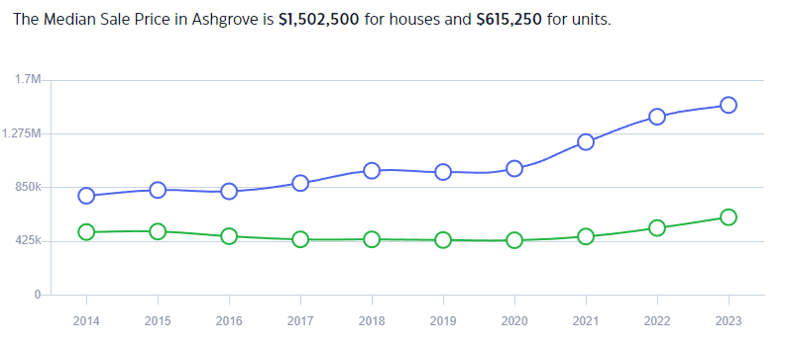
Demographics
Ashgrove’s population was 13,045 in 2016, which was a 1% increase from 2011.
According to ABS Census Data (2021), 49.13% of adults in Ashgrove are married. The size of the average household is 2.8 people, and the median household monthly income is $14,616.
Age
Most of Ashgrove’s residents are 40–49 years of age (16.9%), followed largely by those under the age of 19.

Occupation
Many of Ashgrove’s residents are professionals (38.8%) and managers (16.3%).

Income
Most residents in Ashgrove reported an annual income of over $182,000.

Links to key market data:
11. Paddington 4064
Main residents: Couples without children
Main occupations: Professional
Median age: 20–29 years
Average property price (house): $1,700,000
Average property price (apartment): $580,000
Statistics from CoreLogic
Paddington is a one-of-a-kind community blending the colonial history and vibrant modern lifestyle of Brisbane.
Suburb profile
Close to: CBD, shops, cafes, restaurants, parks, Brisbane River, recreational facilities, public transport
Paddington is packed with character-filled streets, boutiques and cafes and offers a wide range of dining options. It’s a haven for people who appreciate art, culture and a lively atmosphere.
.jpg?width=753&height=271&name=Group%2048096103%20(5).jpg)
What’s more, Paddington is only a stone’s throw away from the CBD, so it’s close to shops, parks and everything that makes up a wonderful atmosphere for a forever home.
Property value
Paddington’s property value has risen steadily. Between 2014 and 2018, the suburb grew consistently. From 2020 onwards, Paddington spiked due to the post-pandemic rush.

Want to negotiate the best deal for a forever home in Paddington?
Download our free 25 Property Negotiation Questions Checklist so you know the right questions to ask a real estate agent when you’re in the process of buying your home.
Demographics
In 2016, Paddington’s population was 8,554, which was a 7.10% increase from 2011.
According to ABS Census Data (2021), 38.25% of adults in Paddington are married. The average household comprises 2.5 people, and the median household monthly income is $14,968.
Age
Most of Paddington’s residents are aged 20–29 (22.8%) and 30–39 years old (17.3%).
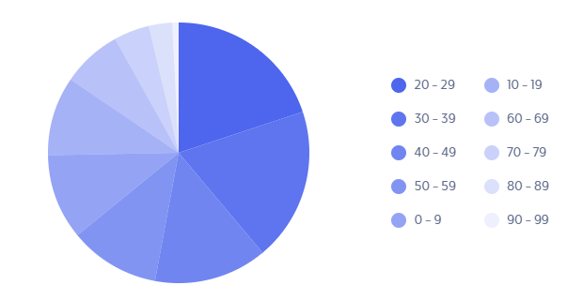
Occupation
Almost half of Paddington’s residents are professionals (42.2%).
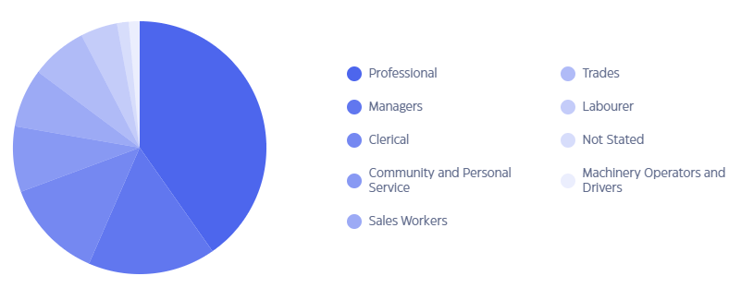
Income
The majority of residents in Paddington reported a yearly income of over $182,000.

Links to key market data:
12. Holland Park 4121
Main residents: Couples with children
Main occupations: Professional
Median age: 40–49 years
Average property price (house): $1,100,000
Average property price (apartment): $550,000
Statistics from CoreLogic
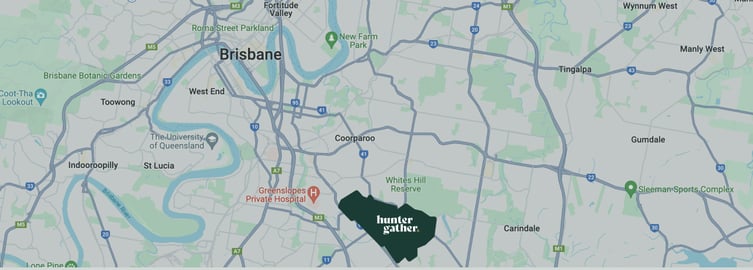
Property value
Holland Park’s property value rose gradually from 2014 to 2020. Between 2014 and 2018, the suburb experienced steady growth. Beginning in 2020, Holland Parl spiked as a result of the post-pandemic rush.
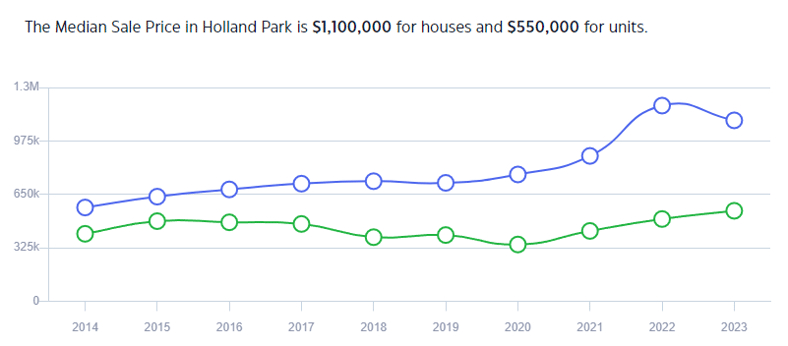
Demographics
Holland Park’s population was 8,116 in 2016 – a 3.40% increase from 2011.
According to ABS Census Data (2021), 45.49% of Holland Park’s adult population is married, with an average household size of 2.6 people and a median household monthly income of $11,768.
Age
Many Holland Park residents are between 40 and 49 years of age (16.4%), followed by 30–39 years of age (15.6%).
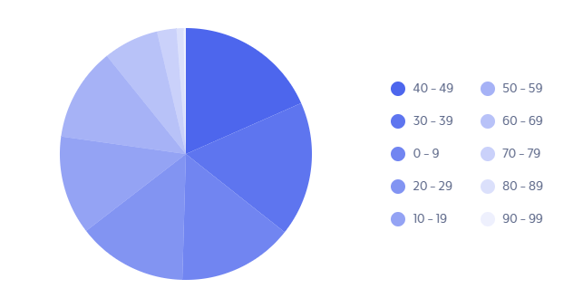
Occupation
Most of Holland Park’s residents are professionals (34.3%).
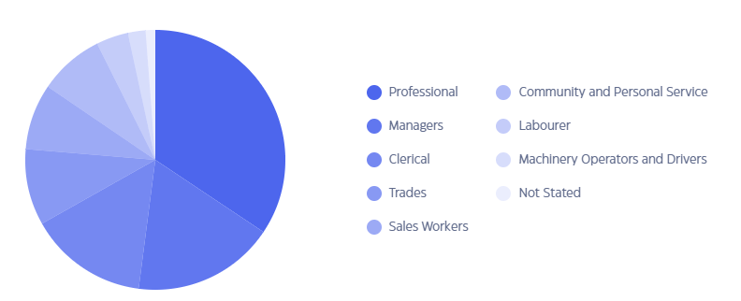
Income
The most commonly reported annual income of residents in Holland Park is between $78,000 and $130,000.
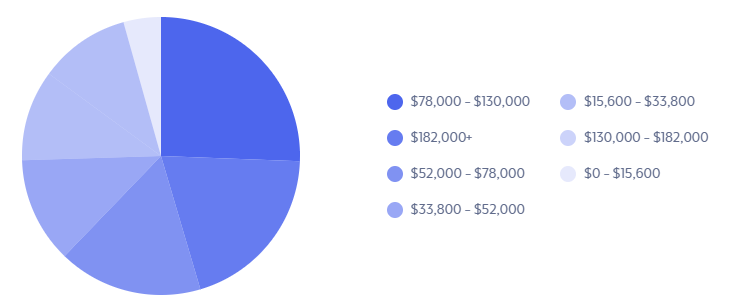
Links to key market data:
It’s time to buy the forever home you deserve.
This is one of the most exciting periods of your life.
However, it can also be incredibly overwhelming.
There’s a ton of stuff to consider when buying a home, from location and price to lifestyle and proximity to amenities.
But now, there’s an easy place to start.
And it all begins with asking the right questions.
We’ve compiled a list of 25 key questions for you to ask your real estate agent when negotiating a property. These questions will help you find out:
- Everything you need to know about the property and the area
- Whether there are any problems with the building you need to worry about
- Whether, ultimately, the property is right for you and your family.
To get started, get this checklist that every savvy buyer needs to have:
25 Property Negotiation Questions Checklist
Then use the questions to negotiate the perfect buy!
Need help for your purchase?
The quickest, easiest and most stress-free way to buy your forever home is to outsource the negotiations to a buyer’s agent.
Your agent will find the right property in Brisbane that matches your goals, negotiate your purchase with the real estate agent and ensure that you land the forever home that you’re looking for.
A buyer’s agent can guide you through the wilderness of the property market, take care of the entire search process and negotiate a sale well below the asking price.
Speak to a buyer’s agent now
(no payment required – just a friendly chat).
IMPORTANT
Before reading, grab our checklist on the 25 questions to ask when negotiating to purchase a Brisbane property.
Have this handy when reading through our list.

.png?width=200&height=91&name=HG%20logo-colour-pms%20(1).png)
